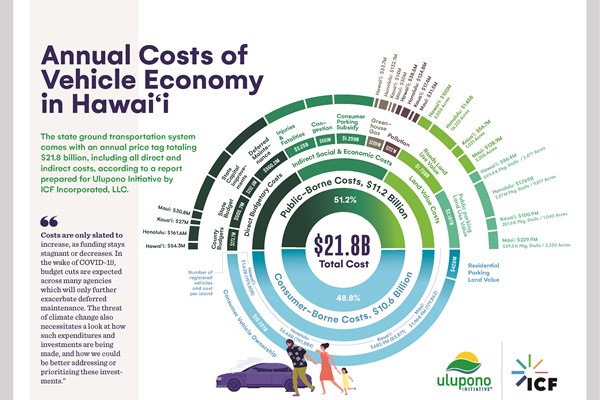Report Examines Hawaii’s $21.8 Billion Vehicle Economy
Jan 26, 2021

FOR IMMEDIATE RELEASE
HONOLULU — Hawaii’s vehicle transportation system comes with an annual price tag totaling $21.8 billion, including all direct and indirect costs, according to a new report released today by Ulupono Initiative.
“The Costs of the Vehicle Economy in Hawaii,” prepared for Ulupono Initiative by ICF Incorporated, LLC, reveals that more than half of the total $21.8 billion, $11.2 billion, is borne by the public in the form of state and county expenditures, social and economic trade-offs, and real estate value of land set aside for roadways and parking. The remaining amount, $10.6 billion, is borne directly by consumers in the form of vehicle ownership costs, including maintenance and operation.
“To help realize a more sustainable, resilient Hawaii, we need to understand what our current transportation investments are to know whether they are helping us meet our critical climate and community goals,” said Kathleen Rooney, Ulupono Initiative’s director of transportation policy and programs. “As in many places, transportation in Hawaii is a major budget expenditure that needs to be evaluated comprehensively.
“The purpose of this report is to provide comprehensive local data to Hawaii leaders as they weigh expenditures and investments to best address community needs and promote our post-pandemic recovery. At the same time, this information will help Hawaii residents make informed choices for themselves and their families about the costs they bear directly as consumers as well as taxpayers.”
Taking care not to use inflated assumptions, the analysis develops a conservative estimate of the costs associated with the vehicle economy using a combination of publicly available budget information, state and federal analysis guidance, academic research, and financial modeling. The report uses a 2019 methodology developed by the Harvard Kennedy School on the vehicle economy in Massachusetts, but that methodology was adjusted to reflect Hawaii’s unique vehicle economy by substituting in available Hawaii-specific data sources and assumptions. In addition, this report also estimates county-level impacts.
Highlights of the Ulupono report include:
- Public costs amount to roughly $15,000 per taxpayer ($24,400 per household), annually, even if they don’t own a car.
- Personal vehicles cost an additional $16,200 per household per year. With the public costs above, each household’s costs total $40,600 per year (or 51 percent of pre-tax income).
- User fees amount to approximately $378 million, annually, almost half of the actual public roadway expenditures from the state and counties — and this gap will expand as 10-15 percent of the state’s highway system is projected to be directly impacted by sea level rise.
- The maintenance backlog is the same as the annual expenditures for both the state and the four counties combined. Our system and planning need to be re-evaluated and right-sized.
- Land value of public lands dedicated to road, highways, and parking is $3.9 billion, covering about 14 percent of the available urban land in our state.
- Many of the public costs are indirect but affect our communities greatly; for example, injuries and fatalities, congestion, greenhouse gas emissions and other pollution, and consumer parking subsidies.
In its conclusion, the report states that “… costs are only slated to increase, as funding stays stagnant or decreases. In the wake of COVID-19, budget cuts are expected across many agencies which will only further exacerbate deferred maintenance. The threat of climate change also necessitates a look at how such expenditures and investments are being made, and how we could be better addressing or prioritizing these investments.”
Rooney added: “It is critical that we understand these transportation costs and impacts, and that we evaluate whether these are the best financial investment we can, and should, make.”
Click here to read the full report.
Click here to view infographic.
About Ulupono Initiative
A mission-driven venture of The Omidyar Group, Ulupono Initiative was founded in 2009 to improve the quality of life for the people of Hawaii by working toward sustainable solutions that support and promote locally produced food, renewable energy, clean transportation, and better management of freshwater and waste. For more information about Ulupono Initiative, visit ulupono.com or connect with Ulupono on Twitter, Facebook, Instagram and LinkedIn.
About ICF Incorporated, L.L.C.
ICF Incorporated, L.L.C., a global consulting services company, is internationally recognized for expertise and leadership in transportation assessment, benefit-cost analysis, greenhouse gas mitigation, and climate resilience planning. For more information about ICF, visit www.icf.com.
Categories
- Clean Transportation (114)
- Renewable Energy (76)
- Agriculture Story Series (20)
- Local Food (127)
- News Releases (19)
- Promotions and New Hires (4)
- Less Waste (8)
- Freshwater (23)
- Our Ohana (15)
- In the News (5)
- careers (1)
- Blog (1)
- clean energy (2)
- PUC (2)
- Ulupono Video Podcast Series Talk Story Room (1)
- Bills (1)
- Legislature (1)
- DA BUX (1)
- Electric Vehicle (1)
- Agriculture (3)
- policy (2)

